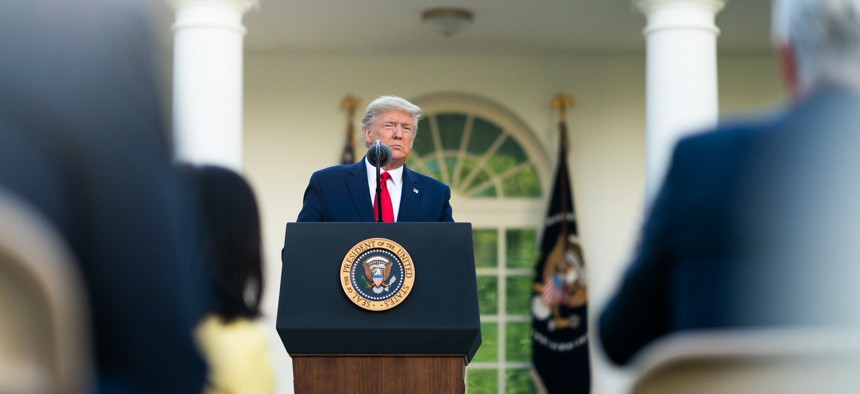
D. Myles Cullen/White House
Viewpoint: Authoritarian Populists Have Six Classic Moves. Trump's Response to COVID-19 Uses 5 of Them.
While the president may not be using the coronavirus to consolidate power, Americans should still be worried about the threat he poses to democracy.
President Trump’s response to the coronavirus pandemic has been disastrous. He has failed to coordinate the country’s actions at the federal level and to implement a nationwide mitigation strategy. But some have argued that this points to a silver lining: Trump is not seizing the moment to consolidate power or become the strongman many have feared.
This should provide little relief. The danger Trump poses has never stemmed from his having a carefully worked out playbook for weakening America’s institutions, step by calculating step. Instead, it stems from his reflexive disdain for independent institutions and for the separation of powers.
This is not the case for all authoritarian populists, some of whom have a highly developed sense of their ultimate destination. When Viktor Orbán became the Prime Minister of Hungary in 2010, he quickly moved to dismantle institutions that limited his power. Within a few years, he was well on his way to dominating the country’s electoral commission, weakening its court system, and limiting the freedom of the press.
Given Orbán’s capacity for discipline and strategy, his use of the pandemic as an excuse to consolidate even more power in his own hands is hardly a surprise. On Monday, the Hungarian parliament was officially suspended. For the indefinite future, Orbán has the power to rule the country by decree. Spreading “false rumors” on social media is now punishable by time in jail.
Hungary, widely celebrated as a model of successful democratization in the 1990s and 2000s, is no longer a democracy.
Donald Trump, to put it politely, does not fit the mold of a disciplined strategist. But, guided by his instincts, and believing that he alone represents the people, he chafes against restrictions on his powers. Over time, he has corrupted the purpose of an ever-growing list of democratic institutions, making them serve his own interests instead of the public good.
Prior to his run for the White House, Trump did not have a bone to pick with the FBI, with career prosecutors at the Department of Justice, or with civil servants at the State Department. But as he saw that none of these institutions blindly followed his partisan political interests, he attempted to bring each of them under his control. As a result, the rule of law is already seriously damaged.
While a disciplined autocrat such as Orbán might be more obviously dangerous to American democracy than an erratic one such as Trump, the latter’s actions fit a similar template that bodes ill for American institutions. Recent history shows that authoritarian populists engage in six categories of assaults on democracy, of which seizing raw executive power is but one. As president, Trump has engaged in each of these behaviors: spreading disinformation, quashing dissent, politicizing independent institutions, amassing executive power, delegitimizing communities, and corrupting elections.
He has politicized the Department of Justice to punish his political enemies. He has filled federal agencies with political loyalists, bypassing the Senate’s advice and consent. He has purged those he perceives as disloyal. He has declared a phony “emergency” at the southern border to override Congress’s decision to deny him the money for a border wall. He has used the machinery of government to retaliate against media companies and members of the press who criticize him. And he has corrupted elections by, among other things, attempting to coerce a foreign government to dig up dirt on a political opponent.
Now, these same tendencies are shaping President Trump’s response to the current pandemic.
First, Trump engaged in a campaign of disinformation to downplay the significance of the virus and overplay his personal success in keeping it at bay.
Second, he has attempted to quash dissent by limiting the press’s access to public-health officials critical of his response; he has also threatened to withhold aid from states who don’t “treat us well,” or who question the effectiveness of his administration.
Third, he has sought to delegitimize vulnerable communities by doubling down on restrictive immigration policies at the southern border that have no relation to preventing the virus’s spread, such as the border wall, and that may even exacerbate it.
Fourth, he has threatened to exercise powers he does not legally possess to “open the economy”—overriding the authority of governors and mayors to impose stay-at-home orders and business closures. (Thankfully, he has, for now, backed off that threat.)
Finally, in this same vein, he has suggested that he may undermine the independence of the Centers for Disease Control and Prevention (CDC) by forcing it to ease social-distancing guidelines against the advice of the agency’s own leaders. Even when Trump purports to listen to the experts, as he apparently did this weekend in walking back his vow to precipitously change the CDC’s guidance, his rhetoric that the guidelines are his to alter remains worrisome.
Perhaps the only authoritarian play Trump hasn’t yet made is corrupting the upcoming election with the pandemic as an excuse. But we are in the early days of this crisis, and the prospects for him to do so—or to abuse his powers in other ways—are manifold.
During this extraordinary public-health emergency, democracies around the world are taking unprecedented steps to keep their citizens safe. America, too, may need to impose some painful restrictions—such as fines for those who flout social-distancing guidance —in order to save lives. That makes not losing sight of the threat Trump poses to American democracy all the more important
This story is part of the project “The Battle for the Constitution,” in partnership with the National Constitution Center.






